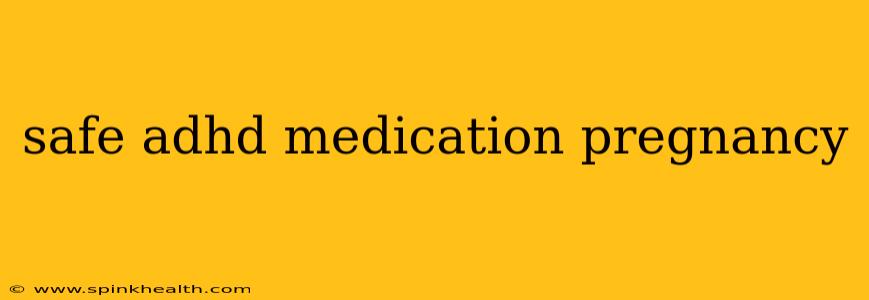The news is wonderful: you're expecting! But if you manage ADHD with medication, a wave of concern might wash over you. Navigating pregnancy while managing ADHD requires careful consideration and open communication with your healthcare providers. This isn't just about your health; it's about the well-being of your developing child. This guide will walk you through the complexities, addressing common questions and concerns.
What ADHD Medications are Considered Safe During Pregnancy?
This is the million-dollar question, and unfortunately, there's no simple yes or no answer. The decision about which medication, if any, is right for you during pregnancy is intensely personal and should be made in close consultation with your psychiatrist, OB-GYN, and potentially a high-risk pregnancy specialist. There's no one-size-fits-all solution. Each medication carries its own set of potential risks and benefits, which must be carefully weighed against the potential risks of not managing your ADHD symptoms.
One thing to understand upfront is that no ADHD medication is definitively proven 100% safe during pregnancy. Research is ongoing, and the potential risks and benefits need to be carefully considered on a case-by-case basis.
Some commonly discussed medications include:
-
Atomoxetine (Strattera): This non-stimulant medication is often considered a first-line option for pregnant women with ADHD, as it’s not a stimulant. However, even with Atomoxetine, potential risks still need to be assessed.
-
Stimulants: Stimulants like methylphenidate (Ritalin, Concerta) and amphetamine (Adderall) are generally avoided during pregnancy unless the benefits significantly outweigh the risks. The decision to use them is made on a case-by-case basis and is only considered in situations where the risks of untreated ADHD are deemed significantly higher.
It is crucial to reiterate: Never stop or change your medication without first discussing it with your healthcare providers. Abruptly stopping medication can be harmful to both you and your baby.
What are the Risks of Taking ADHD Medication During Pregnancy?
The risks associated with ADHD medications during pregnancy are varied and not fully understood. Potential concerns include:
- Preterm birth: Some studies have suggested a possible link between certain ADHD medications and preterm birth, though the evidence remains inconclusive.
- Low birth weight: Similar to preterm birth, a possible, but not definitively proven, association exists between medication use and low birth weight.
- Birth defects: While some studies suggest a slight increase in the risk of certain birth defects, more research is needed to establish a clear causal link. The majority of babies born to mothers taking ADHD medication are born healthy.
- Cardiovascular effects: Some medications may affect the mother's cardiovascular system, which needs to be closely monitored.
It's important to understand that these are potential risks, not guarantees. The absence of robust research means we cannot definitively state the extent of these risks. The key is open and honest communication with your doctors to weigh these potential risks against the risks of untreated ADHD.
What are the Risks of Not Taking ADHD Medication During Pregnancy?
Untreated ADHD during pregnancy can also present significant challenges. These can include:
- Difficulty managing daily tasks: This can increase stress and negatively impact the overall health of both mother and baby.
- Sleep disturbances: Lack of sleep is detrimental during pregnancy.
- Increased anxiety and depression: Untreated ADHD can worsen existing mental health conditions.
- Poor diet and lifestyle choices: Difficulty with organization and planning can lead to less-than-ideal choices affecting both you and the baby.
Your doctor will help you carefully assess the risks of both taking and not taking your medication.
What are the Alternatives to Medication for ADHD During Pregnancy?
While medication is often the most effective treatment for ADHD, other approaches might be considered in conjunction with or as an alternative to medication during pregnancy. These include:
- Therapy: Cognitive behavioral therapy (CBT) and other therapeutic approaches can help manage symptoms.
- Lifestyle changes: Improved sleep hygiene, regular exercise, and a healthy diet can significantly impact ADHD symptoms.
- Support groups: Connecting with other women managing ADHD during pregnancy can provide valuable emotional support and practical advice.
How Can I Find the Right Doctor to Help Me?
Finding the right healthcare team is paramount. Look for doctors with experience in treating ADHD and pregnancy. Consider seeking advice from a high-risk pregnancy specialist if your case is complex. Don't hesitate to seek second opinions until you feel comfortable and confident in the care plan.
Remember, this information is for educational purposes only and should not be considered medical advice. Always consult with your healthcare providers before making any decisions about your medication during pregnancy. The journey of managing ADHD during pregnancy requires a collaborative approach with open communication and a focus on the well-being of both mother and baby.

